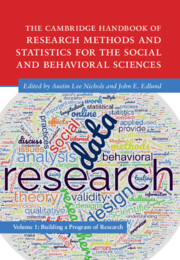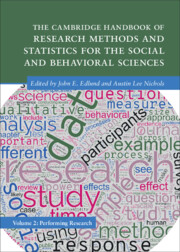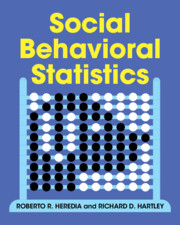The Cambridge Handbook of Research Methods and Statistics for the Social and Behavioral Sciences
The first of three volumes, the five sections of this book cover a variety of issues important in developing, designing, and analyzing data to produce high-quality research efforts and cultivate a productive research career. First, leading scholars from around the world provide a step-by-step guide to doing research in the social and behavioral sciences. After discussing some of the basics, the various authors next focus on the important building blocks of any study. In section three, various types of quantitative and qualitative research designs are discussed, and advice is provided regarding best practices of each. The volume then provides an introduction to a variety of important and cutting-edge statistical analyses. In the last section of the volume, nine chapters provide information related to what it takes to have a long and successful research career. Throughout the book, example and real-world research efforts from dozens of different disciplines are discussed.
- Volume one of a three-volume handbook written for advanced graduate students and current Ph.D. researchers across the social and behavioral sciences
- Authors from dozens of disciplines and countries provide a diverse perspective on performing research within and between disciplines and cultures
- Serves as a step-by-step guide to performing high-quality research and building a productive and sustainable research career
- Covers several common research designs and provides advice for effectively using each
- Provides an introduction to some of the most used and newest statistical techniques
Reviews & endorsements
‘This is an impressive volume with chapters written by well-qualified scholars on a wide variety of topics covering every step along the way of a research project, from theoretical foundations to study design to data collection to data analysis to career advice. I am glad to have this handbook at my fingertips.’ Brad J. Bushman, The Ohio State University, USA
‘This methods handbook wonderfully covers all aspects of research methods including topics that similar volumes often miss like theory development, working outside of academia, and how to be a successful scholar. It is a great read and wonderful addition to any scholar’s library.’ Bradley M. Okdie, The Ohio State University, USA
‘This book covers many topics in methodology and statistics from a wide variety of voices and perspectives. Collectively, they comprise what might be the most comprehensive single book about how to conduct social-behavioral research. Even more than covering the design and conduct of research, the book situates the reader in their role as a scholar, teacher, reviewer, and colleague in advancing rigorous and credible research.’ Brian Nosek, University of Virginia, USA
Product details
June 2023Hardback
9781316518526
600 pages
262 × 185 × 50 mm
1.78kg
Available
Table of Contents
- Section 1. From idea to reality: the basics of research:
- 1. Promises and pitfalls of theory Yzar S. Wehbe, Todd K. Shackelford and Laith Al-Shawaf
- 2. Research ethics for the behavioral and social sciences Ignacio Ferrero and Javier Pinto
- 3. Getting good ideas and making the most of them Christian S. Crandall and Mark Schaller
- 4. Literature review Rachel Adams Goertel
- 5. Choosing a research design Glynis M. Breakwell
- 6. Building the study Martin Schnuerch and Edgar Erdfelder
- 7. Analyzing data Roger Watt and Elizabeth Collins
- 8. Writing the paper John F. Dovidio
- Section 2. The building blocks of a study:
- 9. Participant recruitment Jesse Chandler
- 10. Informed consent to research David S. Festinger, Karen L. Dugosh, Hannah R. Callahan and Rachel A. Hough
- 11. Experimenter effects Jocelyn Parong, Mariya Vodyanyk, C. Shawn Green, Susanne M. Jaeggi and Aaron R. Seitz
- 12. Debriefing and post-experimental procedures Travis D. Clark and Ginette Blackhart
- Section 3. Data collection:
- 13. Cross-sectional studies Maninder Singh Setia
- 14. Quasi-experimental research Charles S. Reichardt, Daniel Storage and Damon Abraham
- 15. Non-equivalent control group pretest-posttest design in social and behavioral research Margaret Denny, Suzanne Denieffe and Kathleen O'Sullivan
- 16. Experimental methods Thomas F. Denson and Craig A. Anderson
- 17. Longitudinal research: a world to explore Elisabetta Ruspini
- 18. Online research methods Kevin B. Wright
- 19. Archival data Jason Miller
- 20. Qualitative research design Sinikka Elliott, Kayonne Christy and Siqi Xiao
- Section 4. Statistical approaches:
- 21. Data cleaning Solveig A. Cunningham and Jonathan A. Muir
- 22. Descriptive and inferential statistics Martha S. Zlokovich, Daniel P. Corts and Mary Moussa Rogers
- 23. Testing theories with Bayes factors Zoltan Dienes
- 24. Introduction to exploratory factor analysis: an applied approach Martin Sellbom and David Goretzko
- 25. Structural equation Modeling Rex B. Kline
- 26. Multilevel modeling D. Betsy McCoach, Anthony J. Gambino and Sarah D. Newton
- 27. Meta-analysis in the social and behavioral sciences Jessica Gurevitch, Anne Moyer and Yuri Jadotte
- 28. Qualitative analysis Nicky Hayes
- 29. Designing a line of research Sheldon Solomon, Jeff Greenberg and Tom Pyszczynski
- Section 5. Tips for a successful research career:
- 30. Successfully publishing research in the social and behavioral sciences Sicong Liu and Dolores Albarracin
- 31. Presenting your research Kelly Cuccolo
- 32. Building fruitful collaborations Mary G. Carey and Wendy M. Brunner
- 33. Performing a good peer review Klaus Fiedler and Christian Unkelbach
- 34. Handling submitted manuscripts: as editor and author Lisa L. Harlow
- 35. Grant writing basics Tamera R. Schneider, Howard C. Nusbaum and Jennifer N. Baumgartner
- 36. Teaching research methods and statistics Jordan R. Wagge
- 37. Working outside academia Kevin A. Byle, Jeffrey M. Cucina, Alexis Avery and Hanna Pillion.




